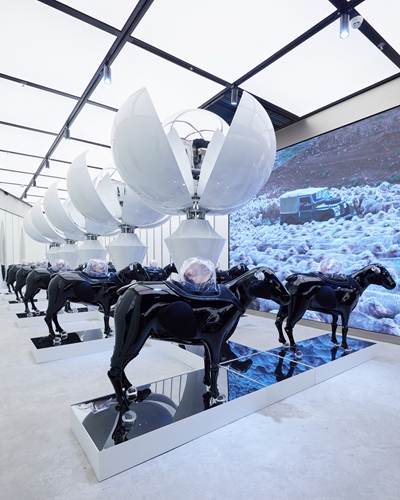HOME >> SOURCE
Selling things, advertising experience
Source:Global Times Published: 2019/12/9 20:53:40
Beijing’s malls are reacting to evolving consumer trends

A set of simulated sheep in SKP-S in Beijing Photos: Courtesy of SKP
Pushing open the northwest door of SKP-South or SKP-S, one will definitely notice a set of simulated howling sheep. From a distance, they might be mistaken as real despite their color and call. They are placed in sheepfolds, surrounded by fodder, farm tools, and wooden boards.Adjacent to the flock is a futuristic-looking black machine. The sheep are neatly arranged between a mirror and the machine as if to resemble a flock from another time.
These two flocks of sheep are located in Beijing SKP's new project SKP-S, which will open in mid-December, right across the street from the flagship shopping mall.
While some may find it hard to imagine this is a luxury shopping mall, that's exactly what is. The difference is this art installation, "Future Farm," makes customers feel like they are visiting an art gallery.
As one of the most upscale malls in Beijing, SKP has always been regarded as the city's shopping "mecca." Data from winshang.com showed that Beijing SKP's sales in 2018 reached 13.5 billion yuan ($1.92 billion), the highest annual sales of any mall in the Chinese mainland.
Farm of the future
"Future Farm" is a project of SKP in collaboration with trendy eyewear brand Gentle Monster, hoping to inspire the viewers to think about the new and beyond-imagination ecosystem that development of digital technology has brought to human's life.
According to SKP, this area is the "Art Experience Space" of SKP-S. Art installations with different themes are launched every year in the hopes of creating cultured shopping experiences.
The mall's artworks could be a series of sculptures by the Italian artist Quayola, an interactive installation by the Israeli artist Daniel Rozin, and Chinese sculptures by contemporary artist, Xu Zhen.
Other shopping malls in Beijing are in fact increasing art displays and experience projects to lengthen customers' stay time and make them spend more.
"We want it to be a place where technology, art and fashion are combined and full of customer experience," said Xie Dan, vice general manager of SKP, elaborating that "we also hope to do something different, to embrace more consumers, more young people, and more people who have different ideas or have the daring to try, no matter what age consumers are."

An art installation consisting of futuristic horses in SKP-S Photo: Courtesy of SKP
Rising spendingThe opening of the futuristic museum-like SKP-S shopping center is based in rising demand from Chinese consumers.
Li Shasha, a 27-year-old white collar worker, often shops at the mall. She prefers this kind of shopping environment and spends around 50,000 yuan per year in the mall.
"The new part of the SKP seems very attractive for me," she said, explaining that she likes brands that are both low-profile and high-end.
Li's shopping footprint is a small part of what is driving China's booming consumption power.
China's retail sales of consumer goods amounted to 33.48 trillion yuan in the January-October period, up 8.1 percent year-on-year. Excluding sales of automobiles, the growth rate reached 9 percent during this period, National Bureau Statistics data showed.
A number of multinational retail companies have increased their investment and accelerated the opening of stores in the Chinese market. The retail influx is taking shape in the backdrop of China's aims of wider opening-up as consumers pursue high-quality products.
Since the beginning of this year, a slew of international companies including Adidas, Nike and Lego have opened new flagship stores in major Chinese cities, while German supermarket chain ALDI entered the Chinese mainland market and Lawson convenience stores swept across third- and fourth-tier cities, according to the Ministry of Commerce (MOFCOM).
China's commercial retail market is rapidly growing and open. The country's consumption structure is constantly upgrading, and residents' consumption is becoming defined by personalized diversification and customization, Gao Feng, spokesperson of MOFCOM said in November.
Global eyewear fashion brand Gentle Monster is expecting a bigger presence in the Chinese market by opening more stores and seeking various partnerships.
The brand, headquartered in South Korea, said it has opened 10 stores in the Chinese market in the past three years.
Hankook Kim, Gentle Monster's founder and CEO, added that the company would continue to seek partnerships in tech and other sectors to offer more creative products.
"We may open six or seven stores in China next year, because there are too many cities in China that we have not been to, and there are too many places that we need to learn more about," said Kim.
RELATED ARTICLES:
Posted in: MARKETS